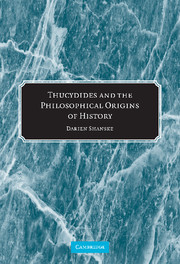Book contents
- Frontmatter
- Contents
- Acknowledgments
- Introduction
- 1 Thucydides's Vision
- 2 The Case of Pericles
- 3 Deinon, Logos, and the Tragic Question Concerning the Human
- 4 Thucydidean Temporality
- Appendix I Restoring Key Terms 1.1–1.23
- Appendix II Pretragic History of Deinon
- Appendix III Wittgenstein on Fly-Bottles, Aspect Seeing, and History
- Appendix IV Heidegger on World and Originary Temporality
- Notes
- Bibliography
- Index
2 - The Case of Pericles
Published online by Cambridge University Press: 19 August 2009
- Frontmatter
- Contents
- Acknowledgments
- Introduction
- 1 Thucydides's Vision
- 2 The Case of Pericles
- 3 Deinon, Logos, and the Tragic Question Concerning the Human
- 4 Thucydidean Temporality
- Appendix I Restoring Key Terms 1.1–1.23
- Appendix II Pretragic History of Deinon
- Appendix III Wittgenstein on Fly-Bottles, Aspect Seeing, and History
- Appendix IV Heidegger on World and Originary Temporality
- Notes
- Bibliography
- Index
Summary
Introduction
The argument to this point has centered on the Archaeology as the lip of the fly-bottle. The Archaeology itself exhibits all of the features we have identified with a world, especially familiarity and consistency in its portrayal of events. Though Thucydides describes his project in disclosive language so clear that it has taken hundreds of years of modern philosophy to obscure it, it is necessarily the case that the means of disclosure recede into the background. By the time the narration of the war starts, if we are not in the fly-bottle yet, it will not take long. In section 1.24, with the introduction of events at Epidamnus, we are rapidly called upon to see connections emphasized in the Archaeology – for instance, that between wealth, power, and stasis (civil war).
There is, of course, no specific moment in which a world is disclosed, and it would not be fruitful to mimic the text and go through it section by section. To illustrate the worldliness of the world that Thucydides discloses, we will thus discuss an exemplary series of passages, characters, and events centered on the figure of Pericles.
There will presumably be no objection to this insofar as the centrality of Pericles is signaled unambiguously by the text itself, from his three unopposed speeches, to Thucydides's praise of Pericles in his own voice, to the echoes of Pericles found in every speech (and decision) that follows his demise, especially those of his Athenian successors.
- Type
- Chapter
- Information
- Thucydides and the Philosophical Origins of History , pp. 41 - 68Publisher: Cambridge University PressPrint publication year: 2006

